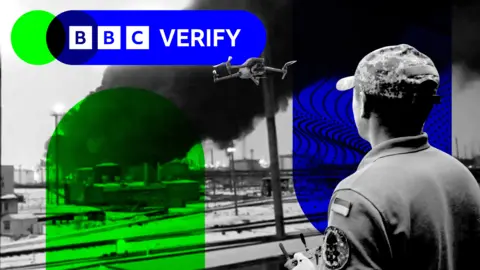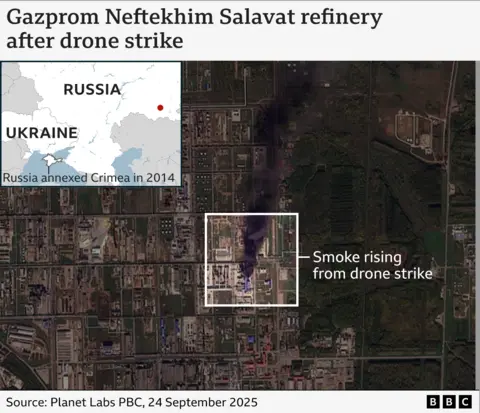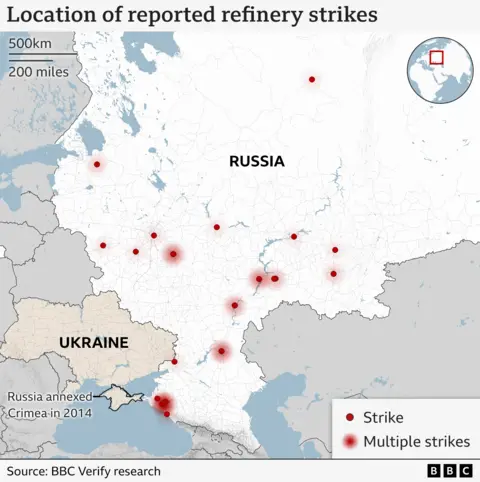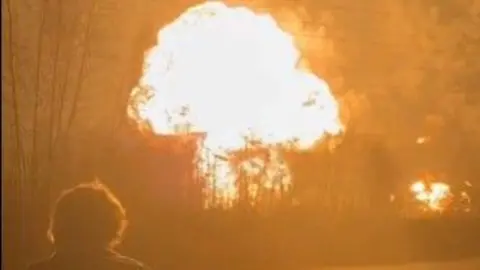Olga Robinson and Mot MurphyBBC verification and
Yaroslava kryukhinaRussian BBC
 BBC
BBCUkraine has increased significantly the number of attacks against Russian oil refineries in recent months, which has sparked a lack of fuel and high prices in some parts of the country, and the BBC has found.
Analyzes of Russian media reports showed and shots verified.
About 21 of 38 large refineries in the country – where crude oil is converted into useless fuel such as gasoline and diesel – since January, with successful attacks by 48 % of 2024.
The ordinary Russians seem to feel the impact of strikes, as the videos that have been verified are lists of long lists at gasoline stations. One of the directors of Russian media told Russian Media that some of the grooms had stopped the operations “to wait for the crisis” instead of working at a confusion.
The security service in Ukraine, SBU, did not want to request a comment. But President Voludmir Zelinski said that the harmful oil industry is a major way to force Russia at the negotiating table.
The Ukrainian leader said in a speech in September. “We have greatly restricted the oil industry in Russia, and this greatly restricts the war.”
Our analysis shows that the reported attacks reached a record level in August, as it targeted 14 Ukrainian drones, and eight in September. This increase came after a short calmness coinciding with a wave of diplomacy, during which President Donald Trump tried to mediate the ceasefire deal between Kiev and Moscow.
Some strikes were launched against deep facilities inside Russia. In late September, SBU succeeded in hitting the oil refinery in Gazprom Neftekhim Salavat in the Bashortostan area twice.
Satellite photos showed smoke from the facility – more than 1100 km (683 miles) from the Ukrainian border – after the attack.

Kyiv also attacked some of the most profitable facilities in Russia. A refinery near Volgaged was targeted six times this year – with an attack in August, forcing it to stop operations for a month. The Grand Riazan factory has been hit near Moscow – capable of producing 340,000 barrels per day – five times since January.
The Ukrainian strikes seem to follow two goals – large refineries necessary for civil supplies and those closest to the borders used to provide forces fighting in Ukraine.
The general corners in Ukraine previously claimed that the refineries in Samara and Saratov were used as part of the military logistical operations. Both regions have been subjected to drones in recent weeks, as two of the three plants in the Samara area have seized non -connection.

Justin Kromb, a former British army officer and CEO of The Risk Consultance Sibylline, told BBC to check that Ukraine has long targeted the oil and gas industry in Russia. But he pointed out that the wave of strikes showed that military and security services have now settled on the tactic as a “basic campaign”.
“It is clear that this campaign was the focus of the great investment, and it is driven by assessing the intelligence of what will harm Russia more than others.”
It is difficult to measure the impact of strikes on gasoline and diesel output, as Russia classifies statistics related to the production of gasoline in May 2024 amid a previous set of attacks on refineries.
But the BBC Verify analysis found that at least 10 oil refineries were forced to suspend full or partial operations since August, and Reuters news agency reported that in certain days of national production The fifth decreased.
 cable
cableThere is some evidence that the straining strikes have an effect on civil life in parts of Russia. The videos confirmed by BBC Verify showed long waiting lists at gasoline stations in the Far East and on a highway between St. Petersburg and Moscow, while officials installed as a gunpowder codified gasoline in the occupied Crimea.
The owners of small and independent gasoline stations in Siberia told the Russian media that they had to close due to the ongoing problems with fuel supplies. A director in the Novosibirk region compared this situation to excessive inflation by the post -Soviet Union.
“In my opinion, we have not had a crisis like this since 1993-1994,” he told Local Outlet Percedent TV. “Many gasoline stations have now suspended its operations. Maybe it is better to wait for the crisis from going out.”
While Russia has traditionally witnessed an increase in prices through the summer travel and the maintenance of the oil refinery, the drone strikes exacerbated them.
Retail gasoline increased, while wholesale prices – the cost in which retailers buy from producers – have risen faster, and have increased by 40 % since January.
The local media tightly controlled that the drone strikes are a major factor of deficiency, as the daily Kommersant newspaper attributes the deficiency to “close the non -scheduled refinery.”
But it seems that civilians in western Russia – including the Moscow and Cracenodar regions – seem largely affected. Some of those who spoke to BBC said they were not aware of the deficiency in other places of the country.
Russian officials insisted that the situation is still under control. During a press conference this week, Karimlin Dmitry Peskov spokesman said that “the government is taking the necessary measures” to address the shortage.
But Deputy Prime Minister Alexander Novak announced last week that a partial ban on gasoline exports had extended until the end of 2025. Opposition politician Mr. Milov indicated that the export suspension was relatively small and that “he would not save the local market.”
The extent affecting strikes that affect Moscow’s ability to use oil revenues to finance its war in Ukraine is also unclear.
The vast majority of oil exports in Russia are in the form of non -repetitive raw oil, which does not seem to be affected by the strikes. An analysis by Bloomberg at the end of September showed that crude oil exports – while less profitability of gasoline and diesel – have reached a record level.
Mr. Crump noted that the effect of strikes can be enhanced if “additional measures” were adopted and the sanctions targeting oil exports by the West were adopted, but stressed that the attacks undermine Moscow’s ability to fight the war.
“This campaign alone will not bring Russia to its knees, but it certainly increases the pain of the lengthy conflict.”
Additional reports by Christine Gevance.

https://ichef.bbci.co.uk/news/1024/branded_news/4fb1/live/56fc9310-9ec3-11f0-928c-71dbb8619e94.png
2025-10-02 08:52:00














